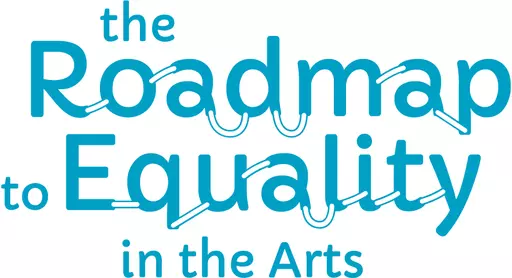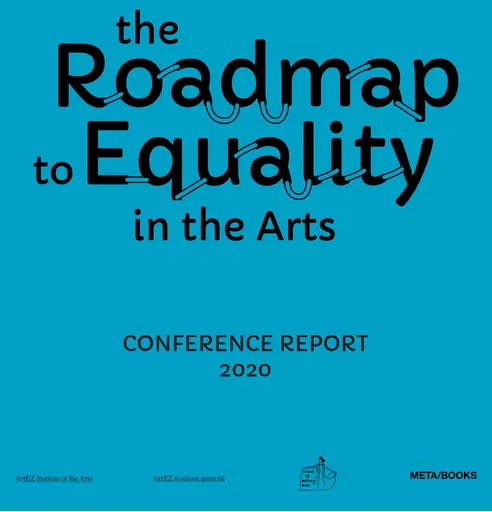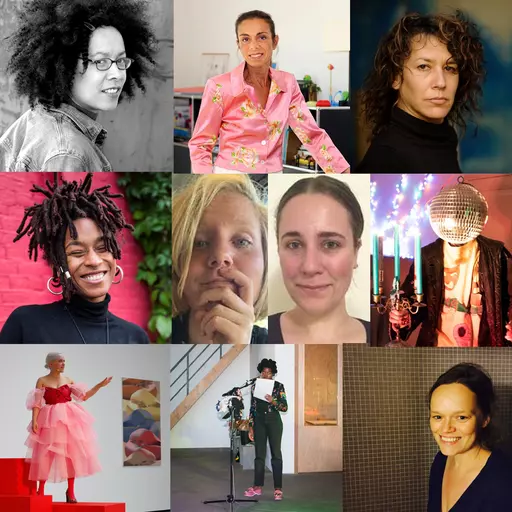Agnes Saal, Galit Eilat & Pauline Salet (2/7)
The Roadmap for Equality in the Arts in the Netherlands, 18 January 2020
videotopic: The Roadmap to Equality In The Arts
Conference 'The Roadmap for Equality in the Arts in the Netherlands'
ArtEZ University of the Arts, Arnhem. January 18, 2020
The conference The Roadmap to Equality in the Arts in the Netherlands aims to raise awareness, gather available data and mobilise existing networks and collective knowledge in order to establish a gender equality roadmap in the arts in the Netherlands. With performances, keynotes, presentations and panels on data as a catalyst for change, quota, new platforms, art education, discrimination and harassment and models for change.
The Roadmap to Equality in the Arts is an ongoing project to address the position of women artists, non-binary and genderqueer artists in the Netherlands. The initiative is born in the aftermath of the #metoo movement, personal experiences and various surveys recently published in the arts and in the industry in the Netherlands and in Europe. This intersectional and strategic coalition aims to advocate for equality, solidarity and diversity on every level, and address the under-representation and misrepresentation of women artists, women artists of colour, nonbinary and genderqueer artists. Due to a lack of data collection and monitoring, there is no overview of the situation in the visual arts in terms of income, parental leave, pensions, art education, exhibitions, public collections, grants and residencies, etc. Many institutions still haven’t implemented a system of reporting racism, discrimination or harassment. How can we address this situation collectively?
PANEL #01: MISSING DATA AND NEW PLATFORMS
What has changed in the art world since introducing the Fair Practice Code and Code Culturele Diversiteit? The under- and misrepresentation of women in the Dutch art world is undeniable. What is striking though is not just the lack of data but also the lack of an intersectional approach in current research? It is not only important to highlight different, intersecting mechanisms of oppression and exclusion, and how they work together, but also to question the binary categories of male and female. Only then we might find solutions to the underlying, structural mechanisms of exclusion.
PANEL: MISSING DATA
The first panel addresses the importance of data as a catalyst of change.
AGNES SAAL (Senior Civil Servant for Equality, Diversity and the Fight against Discrimination Equality and Diversity Department Ministry of Culture)
Pre-recorded phone conversation with Delphine Bedel about the Equality Roadmap in Culture 2019–2022.
GALIT EILAT (writer, curator and researcher)
The Lobotomised museum / The art object and its context
PAULINE SALET (independent researcher)
Following the example of the Guerrilla Girls, a mapping out the percentage of female artists in eight Dutch museums. The research offers a critical reflection on representation within museum spaces, and on the practice of counting and data collection in feminist research.
ArtEZ University of the Arts, Arnhem. January 18, 2020
The conference The Roadmap to Equality in the Arts in the Netherlands aims to raise awareness, gather available data and mobilise existing networks and collective knowledge in order to establish a gender equality roadmap in the arts in the Netherlands. With performances, keynotes, presentations and panels on data as a catalyst for change, quota, new platforms, art education, discrimination and harassment and models for change.
The Roadmap to Equality in the Arts is an ongoing project to address the position of women artists, non-binary and genderqueer artists in the Netherlands. The initiative is born in the aftermath of the #metoo movement, personal experiences and various surveys recently published in the arts and in the industry in the Netherlands and in Europe. This intersectional and strategic coalition aims to advocate for equality, solidarity and diversity on every level, and address the under-representation and misrepresentation of women artists, women artists of colour, nonbinary and genderqueer artists. Due to a lack of data collection and monitoring, there is no overview of the situation in the visual arts in terms of income, parental leave, pensions, art education, exhibitions, public collections, grants and residencies, etc. Many institutions still haven’t implemented a system of reporting racism, discrimination or harassment. How can we address this situation collectively?
PANEL #01: MISSING DATA AND NEW PLATFORMS
What has changed in the art world since introducing the Fair Practice Code and Code Culturele Diversiteit? The under- and misrepresentation of women in the Dutch art world is undeniable. What is striking though is not just the lack of data but also the lack of an intersectional approach in current research? It is not only important to highlight different, intersecting mechanisms of oppression and exclusion, and how they work together, but also to question the binary categories of male and female. Only then we might find solutions to the underlying, structural mechanisms of exclusion.
PANEL: MISSING DATA
The first panel addresses the importance of data as a catalyst of change.
AGNES SAAL (Senior Civil Servant for Equality, Diversity and the Fight against Discrimination Equality and Diversity Department Ministry of Culture)
Pre-recorded phone conversation with Delphine Bedel about the Equality Roadmap in Culture 2019–2022.
GALIT EILAT (writer, curator and researcher)
The Lobotomised museum / The art object and its context
PAULINE SALET (independent researcher)
Following the example of the Guerrilla Girls, a mapping out the percentage of female artists in eight Dutch museums. The research offers a critical reflection on representation within museum spaces, and on the practice of counting and data collection in feminist research.
related events
related content
publication – 20 mei 2020
Written Report Conference: The Roadmap to Equality in the Arts
refered to from:


